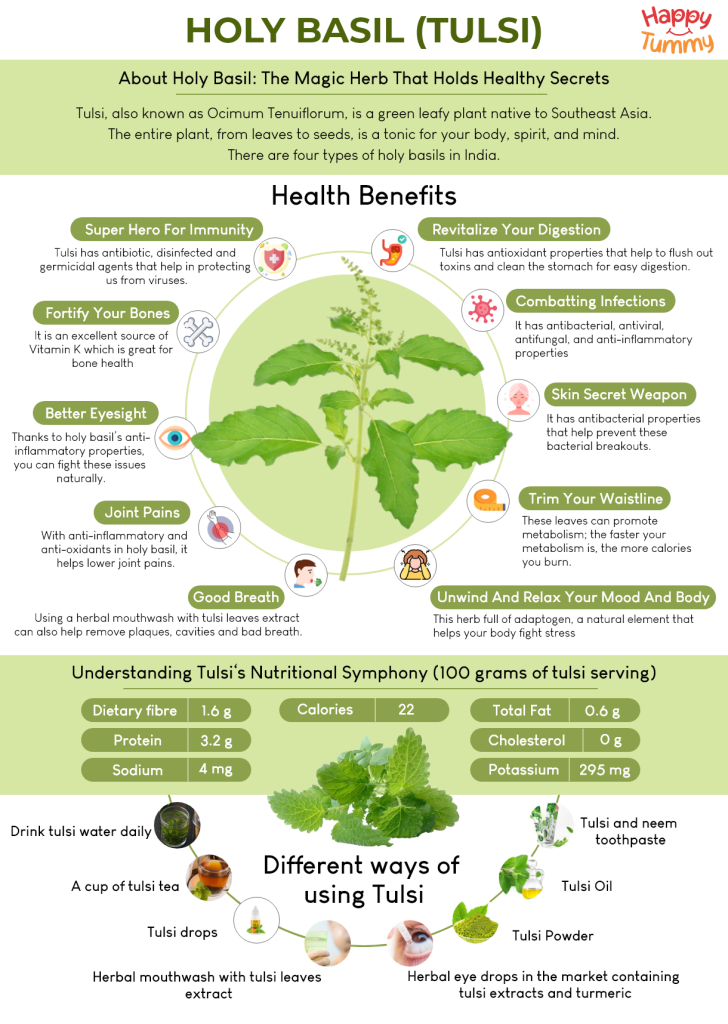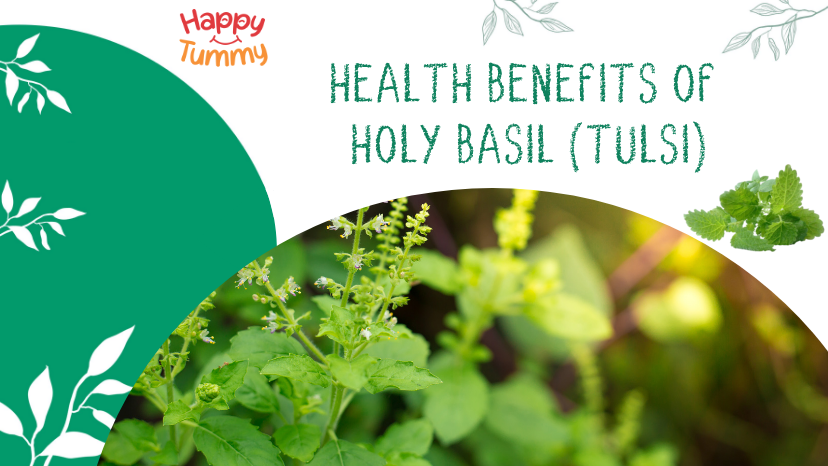Table of Contents
Who hasn’t heard about the goodness of tulsi? Every Indian would have seen the healthy tulsi plant growing in their backyard. But can you imagine this little herb holding the power to rejuvenate and calm your mind and body?
Holy basil, the magical herb cultivated for centuries, offers many health advantages. It has a unique aroma and flavor that can elevate your dishes, especially beverages, in no time.
From adding these tiny little leaves in tea to kadha and lassi to a mojito, there is a lot that you can do.
And if you are wondering what is so special that we had to write an article for it. This incredible plant is not just any ordinary herb grown in every Indian backyard but the powerhouse of goodness.
If you want to know more about what this plant can offer, read till the last to find some amazing and interesting facts.
Holy Basil: The Magic Herb That Holds Healthy Secrets
Are you also confused between sweet basil and holy basil? Sweet basil is a form of basil but with milder tone. Unlike holy basil, it is used for Italian soups and sauces. On the other hand, holy basil, is an amazing and excellent herb which is not just eaten or consumed but also worshipped in India.
Tulsi, known as Ocimum tenuiflorum, is a green leafy plant native to Southeast Asia. In India, we have been using tulsi for centuries for health reasons.
You won’t believe it, but the entire plant, from leaves to seeds, is a tonic for your body, spirit, and mind [1]. Its flowers, leaves, seeds, and oil can be used and even extracted for multiple reasons.
There are four types of holy basils in India, two of which are very common.
Rama tulsi is green and white, Shyam tulsi is dark purple-pinkish, and the other two uncommon ones are Krishna and vana tulsi.
Understanding Tulsi’s Nutritional Symphony
There is a good reason why tulsi is known as the queen of herbs [2]; it is filled with different minerals and nutrients that are fantastic for our human bodies.
In the table below, some valuable nutrients are mentioned that you can get per 100 grams of tulsi serving [3].
Also, remember that holy basil is an excellent source of Vitamin A & C, iron and zinc besides the ones mentioned below:
| Nutrition | Value per 100 grams |
| Calories | 22 |
| Total Fat | 0.6 g |
| Cholesterol | 0 g |
| Dietary fibre | 1.6 g |
| Protein | 3.2 g |
| Sodium | 4 mg |
| Potassium | 295 mg |
Explore The Health Benefits Of Tulsi – Nature’s Secret Weapon For Wellness

This incredible plant is your secret to a healthy life and a happy tummy. It is filled with antioxidants & anti-inflammatory properties, promoting a beautiful and healthy life.
Ancient Indians have used tulsi for medicinal purposes, which is why our elders considered it a super food for our bodies.
Let’s dwell deep to learn some more exciting health benefits.
1. Revitalize Your Digestion With Tulsi
If you are searching for a superfood for your digestion, tulsi can be a game changer [4]. This wonderful herb is known for its digestive properties, making it a superhero for a healthy gut.
Tulsi is considered a perfect herb for combating digestive issues such as gas, indigestion, and bloating. Wondering how? Let’s tell you.
Tulsi has antioxidant properties that help to flush out toxins and clean the stomach for easy digestion. You can drink tulsi water daily for a happy tummy and happier digestion.
Just keep some tulsi leaves soaked in water overnight and drink it empty stomach for better results.
Similarly, you can eat tulsi leaves if you have gas and bloating problems. These tulsi leaves are needed to stimulate your stomach to produce extra mucus to neutralize the accumulated gastric acids.
Holy basil leaves also have gas-inducing properties that can help you with gas and bloating.
Have you heard about the digestive quotient test by Aashirvaad Atta with Multigrain, along with expert nutritionists? If not, check it out today—a simple test designed to check your digestive health score out of 100.
Take India’s first digestive quotient test and find out more about your digestion.
Brought to you by Aashirvaad Atta with Multigrains!
2. Unwind And Relax Your Mood And Body With Tulsi
In today’s world, finding moments of serenity and relaxation is vital for overall well-being. And when you have to unwind, a cup of tulsi tea is what your body needs.
Tulsi is a herb full of adaptogen, a natural element that helps your body fight stress [5].
Sipping your favourite tulsi chai will transport you to a more relaxed environment. It will help you calm and uplift your mood and body.
Drinking this tea is safe; you can drink it daily & make it your routine. An early morning cup will give you the energy and freshness you need for your busy day.
3. Combatting Infections With Tulsi’s Natural Powers
You will be surprised that the holy basil plant you grow in your house has antibacterial, antiviral, antifungal, and anti-inflammatory properties [6].
No wonder it is known as a miraculous health herb that can offer excellent benefits. One of its many benefits is its power to fight infections and heal wounds.
It is simple to use tulsi on the wounded areas. You can take 1-2 drops of tulsi oil & mix it with coconut or any other similar oil & apply it to the infected area.
Its many different natural properties, especially anti-inflammatory, are a perfect wound healing ingredient.
4. Tulsi Your Skin Secret Weapon
It is very common for people these days to face skin issues such as acne and pimples [7]. These happen when hair follicles in your skin are blocked and further get infected due to bacteria.
If you are also facing issues such as acne and pimple, tulsi is your secret weapon. Tulsi or Holy basil has antibacterial properties that help prevent these bacterial breakouts.
There are different ways of using its powder on your skin, especially for acne and pimples. It is very easy to make their paste and apply it to the face.
Mix holy basil powder with yoghurt, papaya slice, neem leaves and cloves, and gram flour. For instance, if using papaya, take one slice, mash it and mix it with 2-3 tablespoons of tulsi powder to make a thick paste. Later apply it on your face, leave it for 10-15 minutes, and rinse with normal-temperature water.
5. Trim Your Waistline with Tulsi
Who doesn’t search for ways to shed those extra kilos from their weight? And if you get a natural ingredient to combat this issue, it is a win-win situation.
Yes, tulsi can be your favourite and readily available ingredient to support your weight loss journey.
Tulsi leaves are an excellent remedy for weight loss. These leaves can promote metabolism; the faster your metabolism is, the more calories you burn.
Moreover, holy basil is high in antioxidants which again encourages weight loss. You can eat 5-6 tulsi leaves with water in the morning to increase your metabolism.
6. Holy Basil for Joint Pains
A simple cup of chai in the morning with holy basil leaves can do wonders. You can consume this herbal tea two to three times a day without worrying about side effects.
With anti-inflammatory and anti-oxidants in holy basil, it helps lower joint pains. You can even find holy basil oil that can be applied to the parts where you feel pain.
7. Holy Basil Your Super Hero for Immunity
If you have read Ayurveda books or journals, you would see how widely they use tulsi for fighting common colds, coughs and fevers. All these and many other viruses affect the human body’s immune system.
Tulsi has antibiotic, disinfected and germicidal agents that help in protecting us from viruses.
You can get tulsi drops from the market that can be used for colds, coughs & fevers. Just add 3-4 drops of holy basil drops to a glass of water & drink it to boost immunity.
8. Fortify Your Bones with Holy Basil
Do you know this incredible little herb is an excellent source of Vitamin K which is great for bone health? It is a fat-soluble vitamin needed by your body for stronger bones.
It is, infact, one of the essential vitamins involved in the process of bone mineralization. Eating raw tulsi leaves or drinking its water can be beneficial for strengthening your bones.
9. Embrace The Power of Holy Basil(Tulsi) for Good Breath
I am sure everybody has heard about tulsi and neem toothpaste in the advertisements. And it’s not limited to toothpaste; you can even get tulsi oil for oil-pulling techniques that can help you fight mouth bacteria.
It is believed that tulsi leaves have compounds that act as a natural mouth freshener and support healthy oral health.
Using a herbal mouthwash with tulsi leaves extract can also help remove plaques, cavities, and, most importantly, bad breath. So, enjoy a refreshing and fresh breath using different tulsi-based oral hygiene products.
10. Holy Basil for Better Eyesight
Holy basil is effective for your eyes. Yes, it may be a surprise to you, but it is true. Like other body parts, your eyes are also susceptible to fungal and bacterial infections.
But, thanks to holy basil’s anti-inflammatory properties, you can fight these issues naturally. You can get herbal eye drops in the market containing tulsi extracts and turmeric that can help you use them as drops for your eyes.
Remember always to check it with a doctor before using anything directly. Your doctor will be perfect to know and suggest whether you need it.
Final Thoughts on Holy Basil (Tulsi)
To close, holy basil is a fantastic herb used in different cultures for centuries. It has surprising health benefits and will convince you to consider it your daily routine part.
Moreover, adding to your diet without worrying about side effects is easy. Believe it or not, holy basil can be your true companion for a healthy, vibrant and happy life.
FAQs
One excellent way to start your day is by drinking tulsi water empty stomach. It is loaded with antioxidants, will flush any leftover toxins, and promote healthy digestion.
You can find four variants of tulsi in India, of which two are commonly grown in households. Rama and Shyam tulsi are common, while Krishna and vana are the other two types.
You can find four variants of tulsi in India, of which two are commonly grown in households. Rama and Shyam tulsi are the common ones, while Krishna and vana are the other two types.
Yes, tulsi is a medical herb with anti-allergic, anti-inflammatory, anti-oxidant and many other properties.















